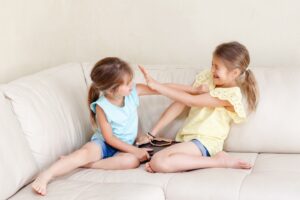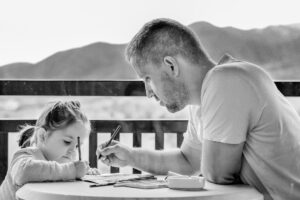About one in ten children is abused. We speak of child abuse when violence is perpetrated on a child. Some children are beaten, yelled at or neglected by adults. What exactly is meant by this and what help is available for affected children, you can read in this article.
Table of contents
Physical Violence
Some parents think it’s okay to hit, push, shake or otherwise be violent with their children. This is often because they themselves have been beaten by their parents or teachers. We often hear about the “healthy slap” and that this is not so bad. Because: naughty children can only be educated in this way. Physical violence, however, is very bad and is also forbidden by law.
Children who are beaten suffer not only because the blows hurt them. They are sad because they cannot understand why their parents beat them. These children no longer feel loved. Some children then become sadder and sadder and don’t tell others about it. For example, they claim that their bruises happened because of “accidents.” Only a few manage to get help themselves by talking openly about it with someone. The effects of physical violence can go so far that the child has to go to hospital because he or she has been badly injured.
If a child is beaten by his or her parents, grandparents, or anyone else, charges can be filed. The perpetrator then receives a fine in most cases. Sometimes he or she is not allowed near the child anymore.
In such cases, the Jugendwohlfahrt (Youth Welfare Office) decides whether the child may continue to live with the parents or not. Sometimes children then move in with other family members or find shelter in a children’s home.
This may sound scary to you. But remember: in a children’s home, the child is no longer beaten and has a better chance of leading a happy life as an adult.
How Do I Recognize Physical Violence To Myself And Others?
Here’s what you need to remember: no matter what the reason, physical violence against children is never okay. Even hitting on the butt because you were “bad” is physical violence. These are injuries that occur when you are physically abused:
- Bruises: especially conspicuously large and multiple bruises.
- Scalds: These are injuries that result from contact with hot liquid. (e.g., redness from dipping your hand in hot water).
- Burns: For example, from cigarettes, irons or stove tops.
- Bone fractures: These are caused by blows with great force.
- Injuries to the organs: These are noticed due to abdominal pain caused by kicks or blows.
Mental Violence
Mental (also: psychological) abuse is just as bad as physical abuse. When parents frighten their children or make them feel they are not worth anything, this is called mental violence. Mental abuse can also look like this:
- The child is mocked.
- It is ignored and indifferent to its parents.
- Sometimes children are even locked up or left alone.
- Also, when children are threatened, this is mental violence.
All of these actions result in the child no longer being able to trust the abuser. They no longer get the love they would actually need. It is not uncommon for children to suffer physical and psychological violence at the same time at the hands of their parents or caregivers. A caregiver is a person who is very close to the child.
Babies and toddlers can also become victims of psychological violence. Because they are dependent on their parents, they suffer particularly badly.
Sexual Violence
Being touched by adults in intimate places when you are a child is called sexual violence (also: sexual abuse). If an adult touches a child between the legs, it is not okay. Likewise, if an adult forces the child to touch him or her in intimate places, that is not okay.
Younger children often do not yet know what such touching means. In any case, if a touch feels weird and you don’t want it, you don’t have to let it happen. Also, it is not okay for an adult to talk about sexual things in your presence.
Other family members often know about the child being abused. However, they do not dare to talk about it. This is very dangerous because then the child will not get help.
Many children forget that they have been sexually abused. This is also called repression. This happens because they can’t explain the strange touches. In this way, the child protects itself.
Sometimes memories of sexual abuse come back when you become an adult. This can be very unpleasant. The worst is when no one wants to believe the victim. Still, it’s important to talk about it in confidence with someone. Sometimes this is a teacher or a therapist. These people are neutral and can listen better than someone from the family.
How Do I Recognize Sexual Violence Against Myself And Others?
The following are warning signs and may indicate sexual violence:
- The child has injuries in the intimate area (between the legs, on the buttocks, on the breast).
- Strange memories and dreams of touching in the intimate area keep coming up.
- The child makes strange movements, grabs others between the legs, or talks about sex.
- The child is very sad, quiet or anxious.
- Suffers from sleep disorders and nightmares or bedwetting.
- Eating and concentration problems occur.
Neglect
Neglecting someone means no longer caring for him or her. When a child is neglected, he or she no longer receives attention, food, or care from his or her parents.
Because children depend on these things, neglect is also a form of child abuse.
Neglected children are usually also victims of physical, sexual, or emotional abuse. It is often the case that neighbors or relatives notice something about the neglect. However, they do not dare to do anything about it.
When a child is neglected, however, one must not look the other way under any circumstances. That is why it is important to do something about it. You can read about how this works in the next section.
Help With Child Abuse
No matter if you are affected by child abuse yourself or if you suspect it in your circle of friends: You are not alone. Contact a teacher of confidence or call the telephone counselling service yourself (telephone number in Germany: 0800/1110111 or 0800/1110222; telephone number in Austria and Switzerland: 147). The experts you can talk to there will then give you the contact details of the following agencies in your area:
- Child protection centers.
- Special doctors and hospitals.
- Youth welfare.
- Police.
Of course, you can also go directly to the police and file a report. Afterwards, however, you will still need help from one of the agencies mentioned above. The police officers can also help you with this.
What Happens Then?
Depending on how you or the victim are doing at the moment, hospitalization may be an option. Your wounds will be treated there.
Normally, you will then have an initial consultation with a psychotherapist. These are people with whom you can talk openly and in confidence. They are bound by professional secrecy. This means that they are not allowed to pass on anything you tell them.
Talking to a psychotherapist on a regular basis helps you to come to terms with what has happened. In this way, you can manage to stop feeling sad or angry at some point.
The youth welfare service will then take a close look at the case. If the victim has previously lived with the perpetrator, he or she does not have to move back. He or she will then be assigned a social worker. These are people who know a lot about child abuse (and similar things). Then they will look for a suitable children’s residential home. Usually, the victim does not have to move in there right away. First, there is a trial appointment to take a look at the caregivers and the residence.
Worksheet For The Text
1) Explain the difficult words from the text.
What does…
- Neglect
- Social workers
- Confidentiality
- Psychotherapists
- Child abuse
- sexual violence
- Caregiver
- mental violence
- physical violence
2) Write here the number of the telephone helpline for your country.
3) By which injuries can you recognize physical violence?
Photo: Robert Hoetink / bigstockphoto.com












